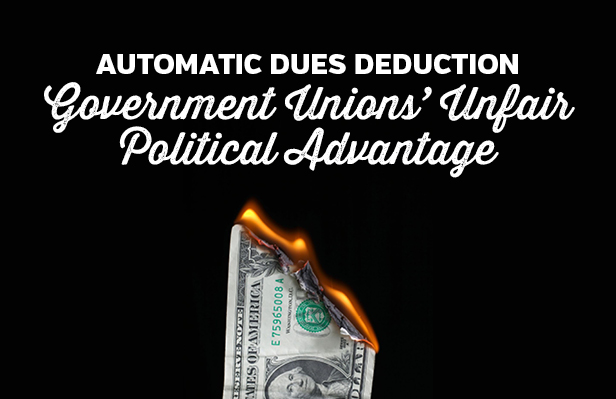Media

Taxpayer Collection of Union Political Money is Unique
Paycheck protection opponents claim that other groups, like charities and insurance companies, are allowed to use taxpayer resources for their deductions, just like government unions. But are all paycheck deductions created equal?
1.) Unlike other paycheck deductions, taxpayers are collecting inherently political money for government unions.
Union dues and PAC campaign contributions—unlike charitable donations and insurance premiums—are inherently political. By their own admission, government unions charge members not only for services rendered (collective bargaining and other representational activities—the so-called “fair share” fee amount), but charges an amount over and above that can be used for political purposes. For example, the PSEA charges about 35% more than the “fair share” amount, which can go towards lobbying and political activities. Highmark can’t do that – they only charge for the cost of insurance. United Way can’t do that either. And no other private or political organization can have the taxpayers collect their campaign contributions.
As a result of a recent federal court ruling, unlimited amounts of union dues can now flow to “SuperPACs,” allowing unions to spend money in support of or opposition to candidates for public office.
So while union members and taxpayers are charged with bankrolling the political operations of government unions, the same is not done for charities and insurance companies. State records reveal more than $700,000 in union PAC money was collected by taxpayers, but the State Treasurer could not identify any other PACs utilizing state resources to fill its campaign coffers.
2.) Government unions can shut down government to negotiate collection of their political money. Charities and insurance companies have no such power.
Government unions have the ability to require state and local governments to collect their political money, regardless of the taxpayers’ wishes. If state or local governments refuse, union leaders are in a position to strike until their political privilege is restored. In contrast, charities and insurance companies are in no position to stop the business of government to demand collection of their political dollars.
3.) Employees who want to write a check for their union dues cannot.
Unlike other deductions, which are done at the request of employees and which they can opt out of, government collection of union dues and PAC contributions are required by union contracts. This cycle with taxpayers serving as the middle man prevents teachers and public employees from being able to hold their unions accountable for their political spending.
4.) Why SHOULD taxpayers collect the political money of government unions?
This is a matter of fairness and protecting the rights of union members and taxpayers who should not be forced to subsidize the political speech of anyone. The obfuscation of those opposed to paycheck protection is simply an attempt to distract from the issue at hand: Should taxpayers be forced to collect union political funds and campaign contributions?